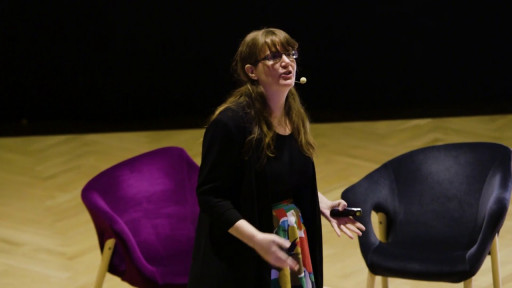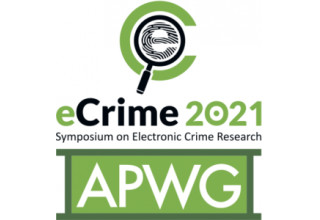
Alice Hutchings, University of Cambridge Lecturer in the Security Group at the Computer Laboratory
Alice Hutchings, a University Lecturer in the Security Group at the Computer Laboratory, a Fellow of King's College and Deputy-Director of the Cambridge Cybercrime Centre.
The 2021 APWG Symposium on Electronic Crime Research (APWG eCrime 2021), convenes on December 1-3 this year, coming after a historic pandemic that brought with it a cybercrime wave that tested the skills of responders and cyber forensicists across the globe, an unprecedented onslaught of criminality that APWG believes will inspire keystone new research at eCrime 2021.
Bringing fresh eyes to the unfolding advance of cybercrime in this landmark year is a vital, new management team for APWG eCrime 2021.
APWG has appointed University of Cambridge's Alice Hutchings, a University Lecturer in the Security Group at the Computer Laboratory, a Fellow of King's College and Deputy-Director of the Cambridge Cybercrime Centre, as the General Chair of the symposium.
University of Ottawa's Guy-Vincent Jourdan, a full professor and program coordinator for cybersecurity at the School of Electrical Engineering and Computer Science, and an inaugurating research fellow of the APWG Crypto Currency Working Group, will assist in the development of the symposium this year as Program Chair.
Dr. Jourdan, considering the focus of this year's symposium, said, "The last 12 months have been unprecedented in cybercrime activities, arising from the COVID pandemic and increased activities in extremist communities. We anticipate that these will be some of the themes of this year's eCrime papers.
"We also anticipate to witness ever-increasing sophistication in research using machine learning for classifying and detecting cybercrimes. Of course, cryptocurrencies - cryptocurrency-based crimes - are also in everyone's mind, so we expect to see some good communications on that topic as well," Dr Jourdan said.
This, the 16th Symposium on Electronic Crime Research, consists of a three-day virtual program (teleconferencing details TBA) composed of keynote presentations, technical and practical sessions, and interactive panels. An overarching goal of these meetings is bringing together academic researchers, industry security practitioners, and law enforcement to discuss and exchange ideas, experiences and lessons learned combating cybercrime.
Submission topics include but are not limited to:
- Detecting and/or mitigating eCrime (e.g. online fraud, malware, phishing, ransomware, etc.)
- Measuring and modeling of eCrime
- Economics of online crime
- eCrime delivery strategies and countermeasures (e.g. spam, mobile apps, social engineering, etc.)
- Security assessments of mobile devices
- Behavioral aspects of cybercrime victimization and prevention
- Public Policy and Law for online crime
Papers should be submitted at: https://ecrime2021.hotcrp.com/
Instructions for authors are available on the conference webpage, see: https://apwg.org/eCrime2021/#cfp
Accepted papers will be published in proceedings with IEEE. In addition, cash awards will be given for the best paper overall and the best student co-authored paper. We anticipate the conference will be held online this year.
Symposium notes: https://apwg.org/ecrime2021/
Important Dates:
Full Papers registration and submission due: September 10, 2021
Conference: December 1-3, 2021
Organizing Committee
General Chair:
Alice Hutchings, University of Cambridge
https://www.cl.cam.ac.uk/~ah793/
Program Chair:
Guy-Vincent Jourdan, University of Ottawa
https://www.site.uottawa.ca/~gvj/
Program Committee:
Adam Oest, PayPal
Anshul Rege, Temple University
Daniel R. Thomas, University of Strathclyde
Enrico Mariconti, University College London
Federico Maggi, Trend Micro
Hossein Siadati, Google Inc.
Jonathan Clough, Monash University
Qian Cui, Amazon AWS
Lisa Sugiura, University of Portsmouth
Luca Allodi, Eindhoven University of Technology
Marianne Junger, University of Twente
Markus Jakobsson, ZapFraud
Moury Bidgoli, Pennsylvania State University
Nektarios Leontiadis, Facebook
Platon Kotzias, NortonLifeLock Research Group
Rebekah Overdorf, EPFL
Sergio Pastrana, Universidad Carlos III de Madrid
Shuang Hao, UT Dallas
Timothy Barron, Yale University
Tyler Moore, University of Tulsa
Yun Shen, NortonLifeLock Research Group
Zhibo Sun, Arizona State University
Media Contacts:
Foy Shiver, 404-434-7282, foy@apwg.org (conference development) and;
Peter Cassidy, 617-669-1123 (research development)
About the APWG Symposium on Electronic Crime Research and the APWG
The Symposium on Electronic Crime Research (APWG eCrime), founded in 2006 as the eCrime Researchers Summit, is an annual peer-reviewed conference featuring a comprehensive venue to present basic and applied research into electronic crime and engaging every aspect of its evolution - as well as technologies and techniques for eCrime detection, related forensics and prevention. Since then, what had been an initially technology-focused conference has incrementally expanded its focus to cover behavioral, social, economic, and legal / policy dimensions as well as technical aspects of cybercrime, following the interests of our correspondent investigators, the symposium's managers as well as the guidance of APWG's own directors and steering committee members. Scores of papers exploring these dimensions of cybercrime at APWG eCrime have been published by the IEEE <https://ecrimeresearch.org/ecrime-research-papers/> as well as by Taylor & Francis and the Association of Computing Machinery (in the very earliest years of this conference). With its multi-disciplinary approach, APWG eCrime every year brings together the most heterogeneous community of counter-eCrime researchers and industrial stakeholders to confer over the latest research and to foster collaborations between the leading investigators in this still-nascent field of cybercrime studies. The founding of APWG eCrime stemmed from the directors' early interaction with the researchers who turned to cybercrime problem spaces as a vector for rigorous scientific inquiry, many of whom needed event data to fortify and inform their research regimes.
Founded in 2003, the Anti-Phishing Working Group, (APWG) is the global industry, law enforcement, and government coalition focused on unifying the global response to electronic crime. Membership is open to qualified financial institutions, online retailers, ISPs, ESPs, domain name registrars and registries, and telcos, the law enforcement community, solutions providers, security services providers, multi-lateral treaty organizations, research centers, trade associations and government agencies. There are more than 2,000 companies, government agencies and NGOs participating in APWG worldwide. APWG's www.apwg.org and education.apwg.org websites offer the public, industry and government agencies practical information about phishing and electronically mediated fraud as well as pointers to pragmatic technical solutions that provide immediate protection. The APWG is co-founder and co-manager of the STOP. THINK. CONNECT. Messaging Convention, the global online safety public awareness collaborative and founder/curator of the Symposium on Electronic Crime Research, the world's only peer-reviewed conference dedicated specifically to electronic crime studies. APWG advises hemispheric and global trade groups and multilateral treaty organizations such as the European Commission, the G8 High Technology Crime Subgroup, Council of Europe's Convention on Cybercrime, United Nations Office of Drugs and Crime, Organization for Security and Cooperation in Europe, Europol EC3 and the Organization of American States. APWG is a founding member of the steering group of the Commonwealth Cybercrime Initiative at the Commonwealth of Nations. Among APWG's corporate sponsors are: Acronis, Afilias, AGARI, AhnLab, AT&T, Allure Security, AREA 1, AIT, Avast, Awayr AI, AXUR, Bolster, ByteDance, CaixaBank, Check Point, Cisco, CLARO, Cloudflare, CLOUDMARK, COFENSE, Coinbase, Comcast, CSC, CSIRT BANELCO, CSIS, CYREN, Cyxtera, CZ.NIC, DigiCert, DNS Belgium, DomianTools, Entrust Datacard, ESET, Facebook, FirstRand, Fortinet, FraudWatch, GetResponse, GMS Securidad, GoDaddy Registry, Group-IB, Hitachi Systems, ICANN, Infoblox, Ingressum, IQ Global, iThreat, Kaspersky, KnowBe4, Lenos Software, LINE, Looking Glass, LSEC, Mailshell, McAfee, Microsoft, Mimecast, NAVER, Netcraft, NetSTAR, Noblis, Nominet, Opera, OpSec Security, Palo Alto Networks, PANDI, PayPal, Phishlabs, Proofpoint, Rakuten, Red Sift, REDIRIS, RiskIQ, RSA, Salesforce, Secutec, SIDN, SlashNext, Sopos, SWITCH, Symantec, Thomsen Trampedach, ThreatSTOP, TNO, TrendMicro, Trustwave, Twilio, Vade, Verisign, Viettel Cyber Security, Webroot, workday, zeroFox, ZibaSec, ZIX, ZVELO.
Related Images

University of Ottawa's Guy-Vincent Jourdan
Guy-Vincent Jourdan, professor and program coordinator for cybersecurity at University of Ottawa's School of Electrical Engineering and Computer Science, and an inaugurating research fellow of the APWG Crypto Currency Working Group

eCrime 2021 is the 16th annual edition of the global cybercrime research symposium
eCrime 2021 is the 16th annual edition of the global cybercrime research symposium
Press Release Service by Newswire.com
Original Source: APWG 2021 eCrime Symposium Surveys the CV19 Cybercrime Wave, Its Aftermath and Considers the Future It Portends




